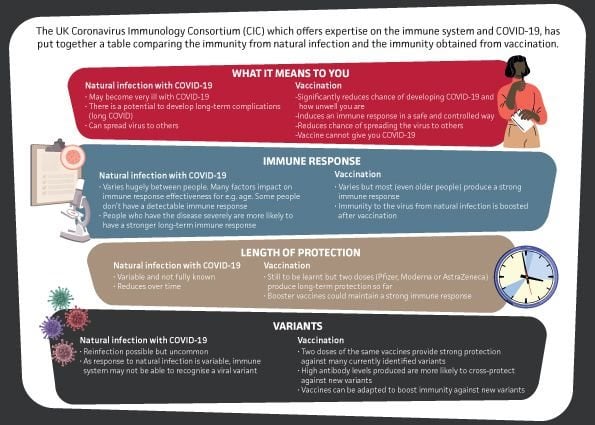All about boosters
What do boosters and vaccines do?
They develop immunity against infections. In the case of Covid-19, when we are fully vaccinated, we acquire what is called ‘vaccine-induced immunity’. However, it has been shown that the immunity created by vaccines may wane over time so an additional dose of the vaccine (full or half strength) – in the form of a booster- is then given to provide the strongest and long-lasting protection possible.
What exactly is immunity?
Simplified, it is your body’s ability to protect you from becoming ill when you encounter a germ (virus, parasite, fungus, bacteria). It is not a simple process but essentially your body produces cells that try to stop the invading germs. This includes cells which ‘memorise’ a particular infection or germ and then recognise it when it returns and try to destroy it.
Immunity can be natural or vaccine induced
Natural immunity is your body’s natural ‘fighting mechanism’ which creates antibodies to fight an infection. If you get a disease mildly (like Covid) you do not develop a powerful natural immunity and your natural immunity, regardless of how strong it is, weakens over time – faster than immunity from a Covid-19 vaccine. For this reason, it is recommended that even if you have natural immunity, you still need a Covid-19 vaccine.
Why is a booster necessary when you are fully vaccinated
Fully vaccinated people have proved to be well-protected from becoming severely ill or dying from Covid-19. So, you may ask why a booster then? Even though vaccines protect you, their efficacy does lessen over time, regardless of which variant of Covid, especially with people 65 years and older. This is not only in the case if a Covid vaccine. If a vaccine does not contain a live, (weakened) virus, a booster is required in most cases.
The Covid vaccine does not contain any form of live viruses and, like other inactivated vaccines, will need several doses over time to remain effective. The booster is designed to help people maintain their level of immunity for longer. It is important to know that immune responses can differ in people who get Covid-19 and recover from the illness
There are many vaccines which require a booster so you’re more than likely going to receive at least one in a lifetime.
When should you have a booster shot?
- For those who received the double-dose Pfizer vaccine, you’re eligible for a booster shot at least 6 months after the final dose of the vaccine was administered
- If you received the Johnson & Johnson vaccine, you should get a booster if you’re 18 or older and got vaccinated two or more months ago
Can you have different booster shots from the original vaccine?
The South African Health Products Regulatory Authority (SAHRPA) has not licensed mix and match vaccines. However, there is good evidence that mix and match vaccines are just as effective (and sometimes better) at increasing antibody levels. SAHRPA has requested submission of evidence to support this approach, so watch their website for updates.
Do booster shots use the same ingredients as existing vaccines?
Yes. Covid-19 booster shots are the same ingredients (formulation) as the current Covid-19 vaccines. Some boosters have the same ingredients but it is not a full dose. J&J and Pfizer boosters are the full dose.
Are there side effects from the booster shot?
There is a chance you may feel like you have mild flu after your booster shot. This could include a sore and even slightly swollen arm, a temperature, a headache and fatigue for a day or two. These symptoms mean that your immune system is responding to the shots and building up immune protection against the coronavirus.
Can I have a booster if I am immune compromised?
Yes, but should be referred by your doctor. Persons who are immunocompromised should receive an additional Pfizer or J&J booster at least 28 days after receiving their last vaccination.
Presently, persons who are considered immune-compromised should have the same booster as the initial vaccine dose (or doses).
Even though there is talk that Covid-19 will move from being a pandemic to endemic, there’s no getting away from the fact that this virus will be part of our lives for a long time and we will need to learn to live with it. Which means that in order for the world to develop immunity against the virus, as many people as possible need to be vaccinated and also receive booster shots.

- When it’s not flu…02 Apr 14:37
- Shining the spotlight on TB24 Mar 15:32
- Transforming healthcare through partnerships18 Mar 10:58
- The Bonitas Top Broker Awards: Recognising partnerships and performance13 Mar 15:52
- Talking about cervical cancer and the HPV vaccine05 Mar 16:09
Related
Getting to grips with healthcare inflation 19 Sep 2024


























